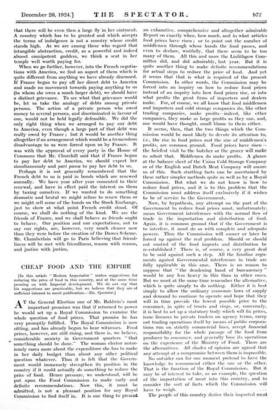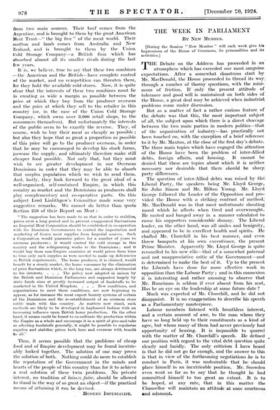CHEAP - FOOD AND THE . EMPIRE [In this article !` Modem
Imperialist" makes suggestions for reducing the price of food in this country, and at the same time pressing on with Imperial development. We do not say that his suggestions are practicable, but we believe that they are of sufficient interest to merit publication.—En. Spectator.] AT the General Election one of Mr. Baldwin's most important promises was that if returned to power he would set up a Royal Commission to examine the whole question _of food prices. That promise he has very promptly. fulfilled. The Royal Commission is now sitting, and has already begun to hear witnesses. Food prices, however, are still rising, and there is, we believe; considerable anxiety in Government quarters " that something should be done." The woman elector notor- iously cares more about the expenditure she has to make in her daily budget than about any other political question whatever. Thus it is felt that the Govern- ment would immensely strengthen its position in the country if it could actually do something to reduce the price of food. Hence pressure, we understand, will be put ,upon the Food Commission to make early and definite recommendations.. Now this, it must be admitted, is not a pleasant position for any Royal Commission to find itself in. It is one thing.to present an exhaustive, comprehensive and altogether admirable Report on exactly When, how much, and inLf what :articles food prices have risen ; or to point out the number of middlemen through whose hands the food passes, and even to declare, wistfully, that there seem to be too many of them. All this and more the Linlithgow Com- mittee ..did, and did admirably, last year. But it is quite another thing to make definite recommendations for actual steps to reduce the price of food. And yet it seems that that is what is required of the present. Commission. In other words, the Commission may be forced into an inquiry on how to reduce food prices instead of an inquiry into how food prices rise, or into what profits the great firms of importers and dealers make. For, of course, we all know that food middlemen and importers and cold storage companies do, like other trading companies, make profits—indeed, like other companies, they make as large profits as they can, and, one would have thought, small blame to them either.
It seems, then, that the two things which the Com- mission would be most likely to devote its attention to, i.e., the rise in food prices and the size of middlemen's profits, arc common ground. Food prices have risen— the briefest visit to the butcher or the grocer will make us admit that. Middlemen do make profits. A glance at the balance sheet of the Union Cold Storage Company or of the English and Dutch Meat Company will assure us of this. Such startling facts can be ascertained by these rather simpler methods quite as well as by a Royal Commission. But what we do not know is how to reduce . food prices, and it is to this problem that the Commission must address itself exclusively if it wishes to be of service to the Government.
Now, by hypothesis, any attempt on the part of the Government to .reduce food prices must, unfortunately, mean Government interference with the normal flow of trade in the importation and distribution of food. Again, it is common ground that if the Government is to interfere, it must do so with complete and adequate powers. Thus the Commission will sooner or later be forced up against the real problem. Should or should not control of the food imports and distribution be re-established ? There is, of course, a very great deal to be said against such a step. All the familiar argu- ments against Governmental. interference in trade are fully applicable in this case. There is no reason to suppose that "the deadening hand of bureaucracy" would be any less heavy in this than in other cases. But we must at the same time remember the alternative, which is quite simply to do nothing. Either it is best simply to allow the Ordinary economic laws of supply and demand to continue to operate -and hope that they will in time provide the lowest possible price to the consumer, in spite of trusts and rings, or, conversely, it is best to set up a statutory body which will fix prices, issue licences to private traders on agency terms, carry out trading operations itself by means of public corpora- tions run on strictly commercial lines, accept financial responsibility for the whole passage of the food from producer to consumer, and generally base its operations on the experience of the Ministry of Food. There are the alternatives. All shades of opinion are agreed that any attempt at a compromise between them is impossible.
No outsider can for one moment pretend to have the knowledge to recommend either the one or the, other. That is the function of the Royal Commission.. But it may be of interest to take, as an example, the question of the importation of meat into this country, and to consider the sort of facts which the Commission will have to weigh. .
The people of this country. derive their imported rne$ from two main sources. Their beef comes from the Argentine, and is brought to them by the great American Meat Trust—" the big five" of the meat world. Their mutton and lamb comes from Australia and New Zealand, and is brought to them by the Union Vold Storage Company—a British firm which has sbsorbed almost all its smaller rivals during the last *w years.
It is, we believe, true to say that these two combines —the American and the British—have complete control of the market, and no competition can threaten them, ibr they hold the available cold stores. Now, it is quite clear that the interests of these two combines must lie in creating as wide a margin as possible between the price at which they buy from the producer overseas and the price at which they sell to the retailer in this country (or, in the case of the Union Cold Storage Company, which owns over 3,000 retail shops, to the consumers themselves). But unfortunately the interests of the public seem to be exactly the reverse. They, of course, wish to buy their meat as cheaply as possible ; but also they hope that as great a proportion as possible of this price will go to the producer overseas, in order that he may be encouraged to develop his stock farms, increase the supply, and ultimately therefore make still cheaper food possible. Not only that, but they must wish to see greater development in our Overseas Dominions in order that they may be able to absorb that surplus population which we wish to send them. And, lastly, they look forward to the great ideal of a well-organized, self-contained Empire, in which this country as market and the Dominions as producers shall play complementary and co-operative parts. On this subject Lord Linlithgow's Committee made some very suggestive remarks. We cannot do better than quote Section 259 of their Report on Meat :
"The suggestion has been made to us that in order to stabilize,
• prices over a long period and to prevent exaggerated fluctuations an Imperial Meat Corporation should be established in co-operation with the Dominion Governments to control the importation and marketing of frozen meat supplies from Imperial sources. Such a Corporation would guarantee prices for a number of years to • overseas producers ; it would control the cold storage in this country and the refrigerating works in the Dominions ; and it would buy from non-Empire countries at world prices from time to time only such supplies as were needed to make up deficiencies in British requirements. The home producer, it is claimed, would benefit by a steady market, the home consumer by the elimination of price fluctuations which, in the long run, are always detrimental to his interests. . . • The policy now adopted in unison by the British and Dominion Parliaments and supported largely by state funds aims at greatly increased output of foodstuffs to be marketed in the United Kingdom. . . . New conditions, and organizations to meet these conditions, are now beginning to appear, as for instance the meat export bounty systems of certain of the Dominions and the re-establishment of an overseas store cattle trade with this country. As matters now stand, such methods are likely to be developed in haphazard fashion with an increasing influence upon British home production. On the other hand, if means could be found to co-ordinate the production within the Empire as a whole and encourage it in a spirit of give-and-take as affecting foodstuffs generally, it might be possible to regularize supplies and stabilize prices both here and overseas with benefit to all."
Thus, it seems possible that the problems of cheap food and of Empire development may be found inextric- ably locked together. The solution of one may prove the solution of both. Nothing could do more to establish the reputation of the Government in the minds and hearts of the people of this country than for it to achieve a real solution of these twin problems. No private ;interest, no tradition of laissez faire, should be allowed to stand in the way of so great an object—if the practical means of attaining it can be devised.
MODERN IMPERIALIST,











































 Previous page
Previous page